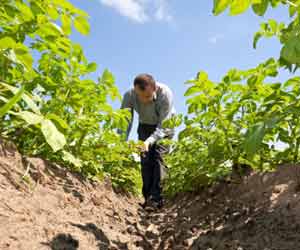Agriculture & Farming Jobs
Today, the term “redneck” is often jokingly used to refer to people from rural communities who like to drink cheap beer and watch NASCAR. Did you know, though, that the term comes from the fact that people who worked in the fields would have red necks from being in the sun all day? It was – and still is, to many – a term that describes salt of the earth people who aren’t afraid to put in a hard day’s work.
The world of agricultural isn’t just a world of corn and cows, though. Working in an agricultural job could mean that you live in a city and spend your time in a research facility or creating laws just as much as it could mean that your daily “suit” is a pair of overalls. One type of job is not more important than the other.
Without people working in all types of agriculture jobs, the shelves are the grocery store would be bare and hunger would kill most of the population, since most people don’t have the time, knowledge, or living space to raise their own crops and animals.
According to the Bureau of Labor and Statistics, there were around 1.3 million jobs for farmers, ranchers, and agricultural managers in 2015, with managers averaging $65,700 annually. There are even more agricultural jobs available when you take into account all of the workers needed in food processing, research, and teaching. Although some parts of the farming industry are declining, other parts of the industry, such as organic farming, are hiring more and more workers every year.
Not every agriculture job requires a degree, and in some cases, you can get started in this field when you’re still in high school. Seasonal jobs are readily available on farms, and many jobs don’t require a diploma or knowledge of the crop – just a willingness to be a dependable, hard-working employee. From there, it is easy to work into a full-time or year-round position, and some of the most successful farmers in the United States have never gone to college; they simply learned what they needed to know through decades of working under others on a farm.
— View Agriculture Industry Job Postings —
You can go the college route as well, though. Many schools offer programs specifically dealing with agriculture, and almost all have programs in biology, chemistry, and other science fields. By getting your degree, you’ll qualify for more advanced positions in the agricultural world. In addition, you can also get a degree in an area like business or finance if you have aspirations of someday owning your own farm. Regardless of the type of work, this is a small business, and learning how to manage it will increase your chances of success.
What kinds of farm-related jobs are out there? General agricultural jobs on farms fall into three main categories:
The type of work you’ll do in any of these three positions depends on the type of farm at which you work some of the most common in the United States include the following:
- Poultry Farms
- Cattle Farms
- Hog Farms
- Other Livestock Farms
- Corn Farms
- Other Grain Farms
- Tropical Crops Farms
- Soybean Farms
- Tobacco Farms
- Cotton Farms
In addition, there are a number of other crop farms on which you can work, as well as specialized farms, which include:
- Dairy Farms
- Greenhouses (Floriculture)
- Orchards
- Tree Farms
- Apiaries (Bee Hives)
- Egg Farms
- Maple Syrup Farms
- Textile Farms
At any of these farms, you could also work in an advanced position running farm equipment. Keep in mind also that the work with agricultural products doesn’t end when it leaves the farm. Food processing work is available across the country, providing jobs working in the following types of places:
- Slaughterhouse and Meat Packing Jobs
- Industrial Rending Plants
- Canneries
- Agricultural Distribution
- Quality Control and Food Safety
Furthermore, workers are needed in the fields of:
- Breeding and Genetics
- Horticultural Sciences
- Agricultural Education
- Agricultural Marketing
- Sustainable Farming
- Agri-tainment
- Working with Biofuels
- Government
As you can see, no matter what your agricultural interests, there are hundreds of different kinds of jobs available. We’re just scratching the surface here; you can find out about all of these positions and more by checking out the pages devoted to each specific kind of job, and don’t forget to also take a moment to read about migrant workers in the agricultural world, individual farms vs. corporate farms, and the top types of farms by state. The key to finding a job you love in any industry is to do your homework and research the positions available for workers.
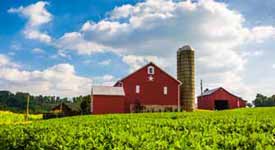
Farming in the World Today
Modern techniques and technology has given the farming industry a massive boost. Follow these links to learn more.
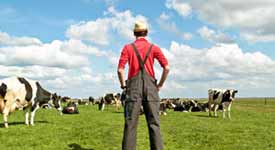
Animal Farming Jobs
Animal Farming is still a popular sector in the industry. These links will fill you in on various livestock farming jobs.

Plant Farming Jobs
With the rising world population, plant based farming is in demand. Follow the links to find out more.

Energy Based Farming Jobs
Fuel and energy based farming is on the rise. With rising fuel costs this sector of the farming industry is on the rise.
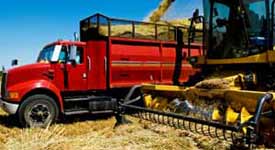
Unique Farming Jobs
Farming in modern times offers some unique opportunities. Click the links below to learn more.
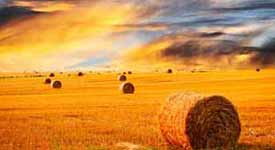
Important Links
The links below will prove invaluable to anyone looking to get into the farming industry.


 Teach English in Asia
Teach English in Asia  Cruise Ship Jobs
Cruise Ship Jobs  Alaska Fishing Industry Jobs
Alaska Fishing Industry Jobs  Sharing Economy / Gig Economy
Sharing Economy / Gig Economy 